(完整版)人教版初中英语七年级下册Unit6SectionB教材全解
(完整版)人教版初中英语七年级下册Unit6SectionB教材全解(可编辑修改word版)
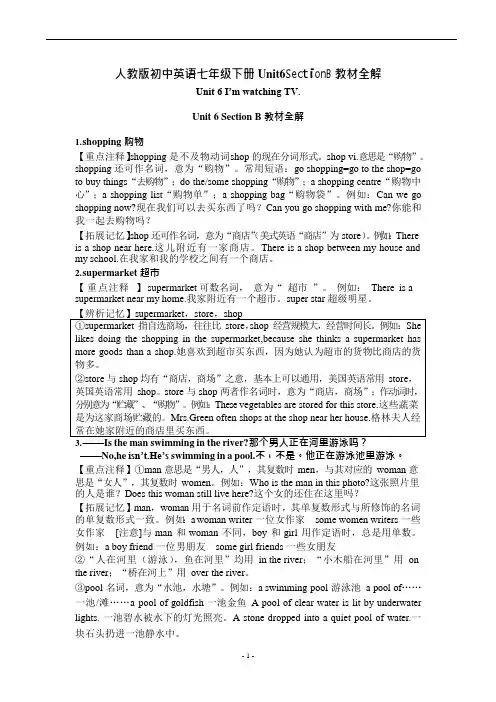
①supermarket 指自选商场,往往比 store ,shop 经营规模大,经营时间长。
例如:She likes doing the shopping in the supermarket,because she thinks a supermarket has more goods than a shop.她喜欢到超市买东西,因为她认为超市的货物比商店的货物多。
②store 与 shop 均有“商店,商场”之意,基本上可以通用,美国英语常用 store , 英国英语常用 shop 。
store 与 shop 两者作名词时,意为“商店,商场”;作动词时,分别意为“贮藏”、“购物”。
例如:These vegetables are stored for this store.这些蔬菜是为这家商场贮藏的。
Mrs.Green often shops at the shop near her house.格林夫人经常在她家附近的商店里买东西。
人教版初中英语七年级下册 Unit6S e c t i o n B 教材全解Unit 6 I’m watching TV.Unit 6 Section B 教材全解1. s hopping 购物【重点注释】shopping 是不及物动词shop 的现在分词形式。
shop vi.意思是“购物”。
shopping 还可作名词,意为“购物”。
常用短语:go shopping=go to the shop=go to buy things “去购物”;do the/some shopping “购物”;a shopping centre “购物中心”;a shopping list “购物单”;a shopping bag “购物袋”。
例如:Can we go shopping now?现在我们可以去买东西了吗?Can you go shopping with me?你能和我一起去购物吗?【拓展记忆】shop 还可作名词,意为“商店”(美式英语“商店”为 store )。
人教版英语七年级下册Unit 6 - Section B教材全解知识点课件
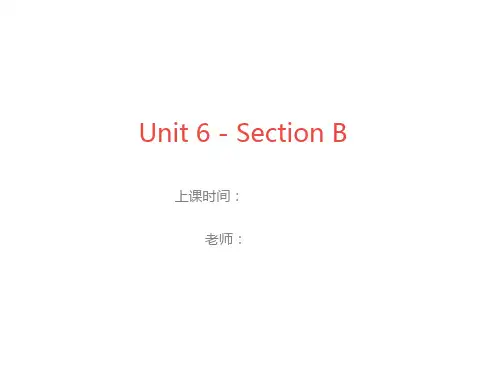
2b TV report
Is Zhu Hui also watching the races and eating zongzi? Well, it’s 9:00 p.m. in New York, and it’s the night before the festival. But there isn’t a Dragon Boat Festival in the US, so it’s like any other night for Zhu Hui and his host family. • any other 其他任何一个;任何其他的…… + 单数名词 Tom runs faster than any other boy in his class. • other, the other, others 与 the others. the other 两者中的另一者,常用于one…, the other… 结构中,意 为 一个……另一个……. I have two pencils. One is red; the other is green.
Unit 6 - Section B
上课时间: 老师:
1a
• shopping 购物 shop for sth. 买某物 shop n.商店 go shopping = do the/some shopping shopping center 购物中心 shopping list 购物清单
Hale Waihona Puke 去购物1b• Is the man swimming in a river? man 可数名词 ,男人,人 - men
1b
• Is the man swimming in a river? man 可数名词 ,男人,人 - men 女人 woman - women man 作定语构成的名词短语变复数时,前后两个名词都要变成 复数形式。 Our school was 40 men teachers and 60 women teachers.
人教版英语七年级下册 Unit 6 Section B (2a-3b)
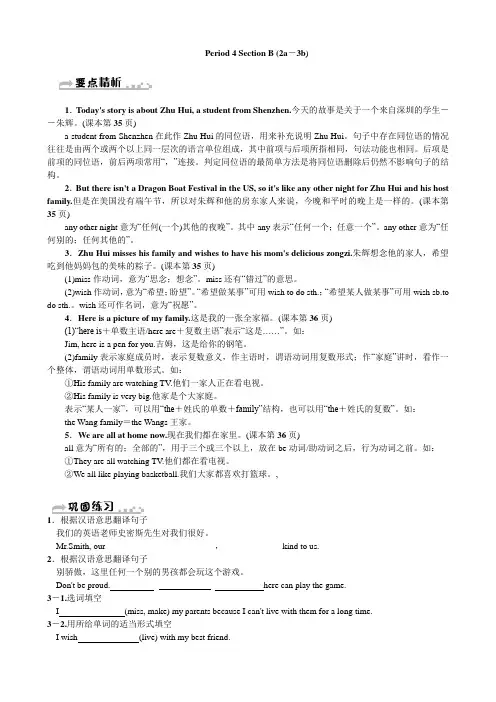
Period 4Section B (2a-3b)1.Today's story is about Zhu Hui, a student from Shenzhen.今天的故事是关于一个来自深圳的学生--朱辉。
(课本第35页)a student from Shenzhen在此作Zhu Hui的同位语,用来补充说明Zhu Hui。
句子中存在同位语的情况往往是由两个或两个以上同一层次的语言单位组成,其中前项与后项所指相同,句法功能也相同。
后项是前项的同位语,前后两项常用“,”连接。
判定同位语的最简单方法是将同位语删除后仍然不影响句子的结构。
2.But there isn't a Dragon Boat Festival in the US, so it's like any other night for Zhu Hui and his host family.但是在美国没有端午节,所以对朱辉和他的房东家人来说,今晚和平时的晚上是一样的。
(课本第35页)any other night意为“任何(一个)其他的夜晚”。
其中any表示“任何一个;任意一个”。
any other意为“任何别的;任何其他的”。
3.Zhu Hui misses his family and wishes to have his mom's delicious zongzi.朱辉想念他的家人,希望吃到他妈妈包的美味的粽子。
(课本第35页)(1)miss作动词,意为“思念;想念”。
miss还有“错过”的意思。
(2)wish作动词,意为“希望;盼望”。
“希望做某事”可用wish to do sth.;“希望某人做某事”可用wish sb.to do sth.。
wish还可作名词,意为“祝愿”。
4.Here is a picture of my family.这是我的一张全家福。
(课本第36页)(1)“here is+单数主语/here are+复数主语”表示“这是……”。
人教PEP七年级英语下学期Unit6_SectionB教材知识详解
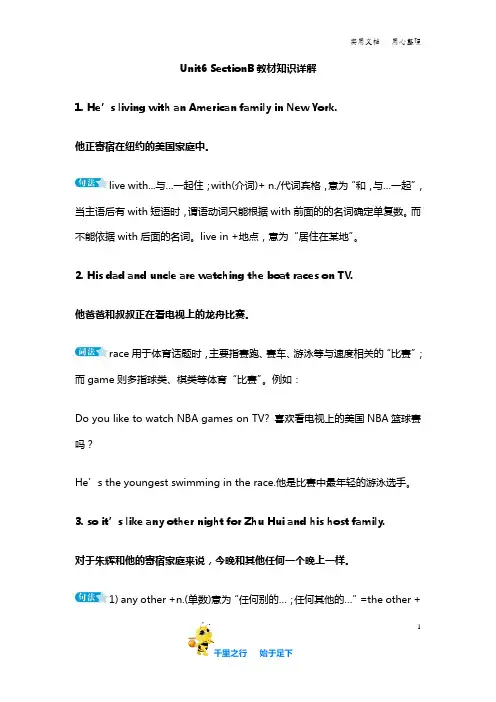
Unit6 SectionB教材知识详解1.He’s living with an American family in New York.他正寄宿在纽约的美国家庭中。
live with...与…一起住;with(介词)+ n./代词宾格,意为“和,与…一起”,当主语后有with短语时,谓语动词只能根据with前面的的名词确定单复数。
而不能依据with后面的名词。
live in +地点,意为“居住在某地”。
2.His dad and uncle are watching the boat races on TV.他爸爸和叔叔正在看电视上的龙舟比赛。
race用于体育话题时,主要指赛跑、赛车、游泳等与速度相关的“比赛”;而game则多指球类、棋类等体育“比赛”。
例如:Do you like to watch NBA games on TV? 喜欢看电视上的美国NBA篮球赛吗?He’s the youngest swimming in the race.他是比赛中最年轻的游泳选手。
3.so it’s like any other night for Zhu Hui and his host family.对于朱辉和他的寄宿家庭来说,今晚和其他任何一个晚上一样。
1) any other +n.(单数)意为“任何别的…;任何其他的…”=the other +1名词复数意为“同一围内除了某人或某物以外的其他人或事物”。
any+n.(单数) 意为“任何一个/任意一个”,用于肯定句,起强调作用。
any+名词复数/n(不可数)意为“一些”,用于疑问句或否定句中,肯定句中some。
如:Any other student in the class can play with you.班里其他的任何一个同学都可以和你玩。
2) host family指人们出国时所借宿的人家,类似汉语中“房东家”。
例如:Do you want to learn to speak English well?Why not go to England and stay with a host family?你想学说一口好的英语吗?为什么不去英国与房东一家人住在一起呢?4.Zhu Hui misses his family and wishes to have his mom’s delicious zongzi.朱辉思念他的家人并且希望吃上他妈妈做的可口的饺子。
新人教版七年级英语下册 Unit6 Section B 1-课件.ppt

supermarket library
pool
Places 1. at school 2. pool 3. supermarket 4. library
Activities playing basketball
swimming shopping reading (books)
1b Look at the pictures in 1a. Then
• 14、Thank you very much for taking me with you on that splendid outing to London. It was the first time that I had seen the Tower or any of the other famous sights. If I'd gone alone, I couldn't have seen nearly as much, because I wouldn't have known my way about.
• 11、夫学须志也,才须学也,非学无以广才,非志无以成学。2020/6/52020/6/52020/6/5Jun-205-Jun-20
• 12、越是无能的人,越喜欢挑剔别人的错儿。2020/6/52020/6/52020/6/5Friday, June 05, 2020
• 13、志不立,天下无可成之事。2020/6/52020/6/52020/6/52020/6/56/5/2020
Don’t be so proud. Any other boy here can play this game. 别那么自负,这里任何一个男孩都会玩这 个游戏。 2) host family 指人们出国时所借宿的人家, 类似汉语中“房东家”。例如:
2019-2020学年人教版英语七年级下册Unit6SectionB(1a–1e)教案
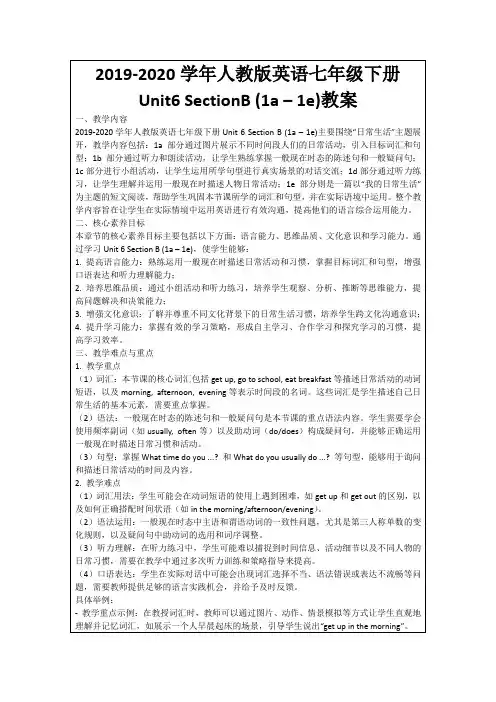
4.提升学习能力:掌握有效的学习策略,形成自主学习、合作学习和探究学习的习惯,提高学习效率。
三、教学难点与重点
1.教学重点
(1)词汇:本节课的核心词汇包括get up, go to school, eat breakfast等描述日常活动的动词短语,以及morning, afternoon, evening等表示时间段的名词。这些词汇是学生描述自己日常生活的基本元素,需要重点掌握。
(2)语法:一般现在时态的陈述句和一般疑问句是本节课的重点语法内容。学生需要学会使用频率副词(如usually, often等)以及助动词(do/does)构成疑问句,并能够正确运用一般现在时描述日常习惯和活动。
(3)句型:掌握What time do you ...?和What do you usually do ...?等句型,能够用于询问和描述日常活动的时间及内容。
同时,我也发现部分学生在听力练习中对于捕捉细节信息还有待提高。为了改善这一情况,我打算在后续教学中加入更多听力策略的指导,如预测、记笔记等,以提高学生的听力理解能力。
2.教学难点
(1)词汇用法:学生可能会在动词短语的使用上遇到困难,如get up和get out的区别,以及如何正确搭配时间状语(如in the morning/afternoon/evening)。
(2)语法运用:一般现在时态中主语和谓语动词的一致性问题,尤其是第三人称单数的变化规则,以及疑问句中助动词的选用和词序调整。
二、核心素养目标
本章节的核心素养目标主要包括以下方面:语言能力、思维品质、文化意识和学习能力。通过学习Unit 6 Section B (1a – 1e),使学生能够:
1.提高语言能力:熟练运用一般现在时描述日常活动和习惯,掌握目标词汇和句型,增强口语表达和听力理解能力;
初中英语七年级下 Unit 6 Section B 2b 参考译文上课讲义
初中英语七年级下U n i t6S e c t i o n B 2b参考译文精品资料初中英语七年级下 Unit 6 Section B 2b 参考译文Students these days often have a lot of worries. Sometimes they have problems with their schoolwork, and sometimes with their friends. What can they do about this? Some people believe the worst thing is to do nothing. Laura Mills, a teenager from London, agrees. “Problems and worries are normal in life,” says Laura. “But I think talking to someone helps a lot. Unless we talk to someone, we'll certainly feel worse.”这些日子学生们经常有很多担心。
有时是关于学业方面的问题,有时是关于朋友方面的问题。
关于此类问题他们能做些什么呢?一些人相信最坏的事情是什么都不做。
劳拉·米尔斯,一位来自伦敦的少年,同意这种观点。
“问题和担心在生活中是很正常的,”劳拉说道。
“但是我认为,与人交谈帮助很大。
如果我们不与人交谈,我们一定会感觉更糟。
”Laura once lost her wallet, and worried for days. She was afraid to tell her parents about it. She even walked three miles to school each day because she didn't have any money. She just kept thinking, “If I tell my parents, they'll be angry!” In the end, she talked to her parents and they were really understanding. Her dad said he sometimes made careless mistakes himself. They got her a new wallet and asked her to be more careful. “I will always remember to share my problems in the future!” Laura says.劳拉曾经丢失了钱包,而且担心了好几天。
人教版七年级下册英语Unit6 SectionB (2a-2c)教学图文课件
B food in the US a race with a family on the phone a story
知识点 1 He’s now studying in the United States.
考点1 study/stʌdi/ v. 学习;研究 考向1 辨析:study 与learn
侧重于学习的过程。 He is studying the math
考点7 children/tʃɪldrən/(单数:child/tʃaɪld/)n. 儿童 e.g. The children are playing soccer. 孩子们正在踢足球。 We have a great time on Children’s Day. 在儿童节我们玩得很快乐。
典例 She has two children , a son and a daughter.
the 内“剩余的 boys,and the others are girls.教室里有
others 全部的人或 20名学生。15名是男孩,其余的都是
物”。
女孩。
再一个/又一
个/另一个的 (人或事物) I want to have another apple. another ”用作形容词 我想再吃一个苹果。 时只修饰可数 名词单数。
知识点 4 The mother is reading a story to her young children.
考点6 young /jʌŋ/ adj. 幼小的;年轻的 e.g. His brother is a young teacher. 他哥哥是一名年轻的老师。
You look younger than me. 你看上去比我年轻。
典例 Catherine has two cousins. One is quiet, and___B___
人教版七年级英语下册(新)《unit6I'mwatchingTV》单元课件(SectionB)
Today’sstoryisaboutZhuHui,astudentfromShenzhen.He’snowstu dyingintheUnitedStates.He’slivingwithanAmericanfamilyinNew York.TodayistheDragonBoatFestival.It’s9:00a.m.AndZhuHui’sf amilyareathome.Hismomandauntaremakingzongzi.Hisdadandun cleareWatchingtheboatracesonTV.
Explanation
1.【any】any既可以用作代词,也可以用作形容词。 (1)作代词,意为“任何一个(些)”。如: Youcantakeanyofthese.你可以随便拿这些中的任何一
个。 (2)作形容词,意为“一些;什么;任何的”,用于疑
问句或否定句,表示“一些”;用于肯定句表示“任何 的”。如: Isthereanyjuiceinthebottle?瓶子里还有果汁吗? Anystudentcananswerthisquestion.任何学生都可以回 答这个问题。
It’seighto’clockint hemorning.
Whattimeisitin Tokyo?
It’snineo’clockint
Whattimeisitin NewYork?
It’seighto’clockint heafternoon.
Whattimeisitin Sydney?
Conversation3 A:Lisa? B:No,thisishersister, Julie. A:Oh,isLisathere? B:No,sheisn’t.She’satthe library. A:Oh.Isshereading? B:Yes,sheis.
人教版七年级英语下册第六单元 Section B
2016-2017年度“一师一优课,一课一名师”晒课内容教学设计人教版七年级英语下册第六单元I’m watching TV.授课教师:门延洪辽宁省凤城市第三中学Unit 6 I’m watching TV.一、Teaching Goal:In this unit students learn to talk about what people are doing.Teach students how to cooperate and be good at watching something and love our lives.二、Teaching difficulties1. The vocabulary and the sentence structures.2. Learn the grammar: Present progressive tense.3. Oral practice using the target language.三、Teaching MethodsListening and practicing methods, pair work, Task-Based Learning method.四、Teaching AidsA tape recorder, some pictures and cards.五、Teaching Time: 5 periodsPeriod 1 (Section A:1a—2b)Teaching ProceduresStep 1.Revision1. Greetings.2. Revise the words and expressions in Unit 4.Step 2.Presatation: Lead in1. Do “Ask and answer” practice with the Ss.2. The teacher asks the students to give more verbs phrases and write them down on the blackboard.(show many pictures to help the Ss.)Teach the new words and expressions.3. Teach the Present Progressive.1)Introduction: Talk about the title of this unit. Show some pictures to introduce the Present Progressive tense.T: What’s she/he doing? Ss: She/He is v-ing (Help the Ss to answer the questions and show the sentences)2) Let the Ss say what the Present Progressive is. (现在进行时表示现在正在进行或发生的动作, 它的表现形式为:Be Verbs + V-ing ….) 3). Tell the difference Write down the V-ing forms by another lines of go, watch, do, play and eat . Ask the Ss to have a look and find the difference between them.For example: go and going, watch and watching, do and doing, etc. Then ask the Ss to read them again and do more exercises.Step3.Activity1a:Match1. Help the Ss talk about the pictures. The Ss read these V-ing words after the teacher. Match the words and the activities. Check the answers.2. Help the Ss do “Ask and answer” practice in pairs.3. Ask some Ss to do actions and let the class guess what he/she is doing.Step4.Activity 1b & 1c: Listening and pair work.1. Play the recording for the Ss to listen. Play again. Ss listen and write the number of the activity each person is doing. Check the answers.2. Pairwork: Ask the Ss to do “Ask and answer” practice about the picture in pairs. Some pairs present their dialogues to the class.Step 5.Activity 2a & 2b: Listening and Practice1. Activity 2a: Talk about the picture in 2b.Ask the Ss to read the questions in 2a. Then listen to the tape and write the answers. Check the answers.2. Activity 2b: Play the recording again. Help the Ss put these questions and answers in order to make a conversation. Go through the answers with the Ss.Step 6 Pairwork: Activity 2c1.Talk about the pictures in 2c. Ask Ss to read the sampleconversation. Let Ss look at the first group of pictures, and ask them to guess what the people are doing.2. Then imitate the sample conversation, work in pairs. Some pairs present their dialogues to the class.3. A guessing game: Guess the activities according to the Ss’ actions. Step 7 Grammar focusGo through the sentences with the Ss. Deal with some lang uage points。
- 1、下载文档前请自行甄别文档内容的完整性,平台不提供额外的编辑、内容补充、找答案等附加服务。
- 2、"仅部分预览"的文档,不可在线预览部分如存在完整性等问题,可反馈申请退款(可完整预览的文档不适用该条件!)。
- 3、如文档侵犯您的权益,请联系客服反馈,我们会尽快为您处理(人工客服工作时间:9:00-18:30)。
人教版初中英语七年级下册Unit6SectionB教材全解Unit 6 I’m watching TV.Unit 6 Section B教材全解1.shopping购物【重点注释】shopping是不及物动词shop的现在分词形式。
shop vi.意思是“购物”。
shopping还可作名词,意为“购物”。
常用短语:go shopping=go to the shop=go to buy things“去购物”;do the/some shopping“购物”;a shopping centre“购物中心”;a shopping list“购物单”;a shopping bag“购物袋”。
例如:Can we go shopping now?现在我们可以去买东西了吗?Can you go shopping with me?你能和我一起去购物吗?【拓展记忆】shop还可作名词,意为“商店”(美式英语“商店”为store)。
例如:There is a shop near here.这儿附近有一家商店。
There is a shop between my house and my school.在我家和我的学校之间有一个商店。
2.supermarket超市【重点注释】supermarket可数名词,意为“超市”。
例如:There is a supermarket near my home.我家附近有一个超市。
super star超级明星。
——No,he isn’t.He’s swimming in a pool.不,不是。
他正在游泳池里游泳。
【重点注释】①man意思是“男人,人”,其复数时men,与其对应的woman意思是“女人”,其复数时women。
例如:Who is the man in this photo?这张照片里的人是谁?Does this woman still live here?这个女的还住在这里吗?【拓展记忆】man,woman用于名词前作定语时,其单复数形式与所修饰的名词的单复数形式一致。
例如:a woman writer一位女作家some women writers一些女作家[注意]与man和woman不同,boy和girl用作定语时,总是用单数。
例如:a boy friend一位男朋友some girl friends一些女朋友②“人在河里(游泳),鱼在河里”均用in the river;“小木船在河里”用on the river;“桥在河上”用over the river。
③pool名词,意为“水池,水塘”。
例如:a swimming pool游泳池 a pool of……一池/滩……a pool of goldfish一池金鱼A pool of clear water is lit by underwater lights. 一池碧水被水下的灯光照亮。
A stone dropped into a quiet pool of water.一块石头扔进一池静水中。
4.Why are Zhu Hui’s family watching boat races and making zongzi?为什么朱辉一家在看船赛和包粽子?【重点注释】①race意为“竞赛”,是可数名词。
例如:We are talking about the race.我们正在谈论这次比赛。
指组成家庭的成员即“家人“时,为复数名词。
例如:1) 他的家庭是个幸福的家庭。
His family is a happy family. 2) 他家人在看电视。
His family are watching TV.5.Does Zhu Hui like his host family?What does he think about his home in China?朱辉喜欢他的寄宿家庭吗?他认为在中国的家怎么样?【重点注释】What do you think about .....?=What do you think of .....?=How do you like .......?你认为……怎么样?What doe she think about .....?=What does she think of .....?=How does she like .......?她认为……怎么样?固定句型,后加名词/代词/动名词。
What do you think about/of this movie?=How do you like this movie?你认为这部电影怎么样?6.He’s now studying in the United States.他现在正在美国学习。
【重点注释】study此处用作不及物动词,意为“学习”;作及物动词,相当于learn。
study还有“深研”之意,程度比learn要深;但learn还可以用于learn to do sth.(学会做某事);learn……from……(向……学习……)/learn from……(向……学习)。
例如:We are studying at school.我们在学校学习。
He studies/learns English in Canada.他在加拿大学习英语。
It’s important for you to learn/study English well.对你来说学好英语很重要。
视上的龙舟比赛。
【重点注释】①race此处作可数名词,意为“竞赛;赛跑”。
例如:Mike takes second place in the race.迈克在赛跑中得了第二名。
②on TV意为“在电视上;通过电视”。
watch……on TV通过电视看……;看电视上的……[注意]on TV此处TV前不带冠词等修饰词。
但on the radio带冠词。
8.But there isn’t a Dragon Boat Festival in the US,so it’s like any other night for Zhu Hui and his host family.但是在美国没有端午节,所以对朱辉和他的寄宿家庭来说,今晚和任何一个平常的晚上是一样的(它就像别的任何一个晚上一样)。
【重点注释】①Dragon Boat,龙舟。
Festival,节日。
(a )Dragon Boat Festival 即龙舟节,端午节②in the US= in the United States=in America=in the USA在美国。
美国的全称是:the United States of America。
③like介词,意为“像……一样”,常和系动词连用。
例如:That is like a kite.那像个风筝。
He looks like my teacher.他看起来像我老师。
[注意]like,动词,“喜欢”的用法。
④any此处用作形容词,意为“任何的;任一的”,与单数可数名词连用,用于肯定句,起强调作用。
例如:Come here with any friend.随便带什么朋友来吧。
Take any book you like.你喜欢哪本书就拿哪本。
【拓展记忆】1)any一般用于疑问句或否定句中,修饰复数可数名词或不可数名词,而肯定句中用some。
例如:Do they have any friends here?他们在这里有一些朋友吗?They don’t have any friends here.他们在这里没有朋友。
They have some friends here.他们在这里有一些朋友。
2)在表示建议、反问、请求或期望得到肯定回答时的疑问句中,多用some而不用any。
例如:Would you like some coffee?你要不要来点咖啡?Would you like some bananas?你想要一些香蕉吗?Can I have some apples?我可以吃些苹果吗?3)any还可作代词,在句中作主语或宾语。
例如:Is there any left?还有剩下的吗?Nobody wants any.没有人想要这些。
4)当any表示“任何”的意义,起强调作用时,可以用在肯定句中。
例如:Any student can answer this question.任何学生都可以回答这个问题。
⑤other此处用作形容词,意为“另外的,其他的”。
例如:Shanghai is larger than other city in China.上海比中国的任何一个城市都大。
He is taller than the other boys in his class.在他的班里,他比其他男孩高。
[注意]如果相比的人或物不在同一范围或不属同一类别,就不用other。
的人或物,泛指同类事物中的三个或三者以上的“另一个”,只能代替或修饰单数可数名词。
例如:I don’t like this one.Please show me another.我不喜欢这一个。
请给我看看另一个。
【图解辩异】①○←→○○○○one the other four②○←→○one the other③○○○←→▲▲▲△△some others④○○○←→▲▲▲▲▲some the others⑤○←→●●●one the others【试题链接】We have two foreign teachers here.One is from England,and is from America.A.anotherB.the otherC.otherD.the others(one…the other…指两者中的“一个……另一个……”。
句意:我们这儿有两个外教,一个来自英国,另一个来自美国。
答案:B)【试题链接】My family has two dogs.One is white, is black.A.otherB.anotherC.the otherD.others(one…the other…指两者中的“一个……另一个……”。
other“其余的”,后跟名词;another“另一个”,用于三者或三者以上的另一个;the other用于二者之间的“另一个”;others“其余的,别的”,后面不能跟名词。
结合句意可知此处指两者之间的另一个。
答案:C)⑥any other意为“其他任何一个;任何其他的……”,是指在同一范围内除了某人或某物以外的其他人或事物,其后接单数名词,也可以说any of the other+复数名词。
例如:Tom runs faster than any other boy(any of the other boys)in his class.汤姆比他班上的其他任何一个男孩跑得都快。
